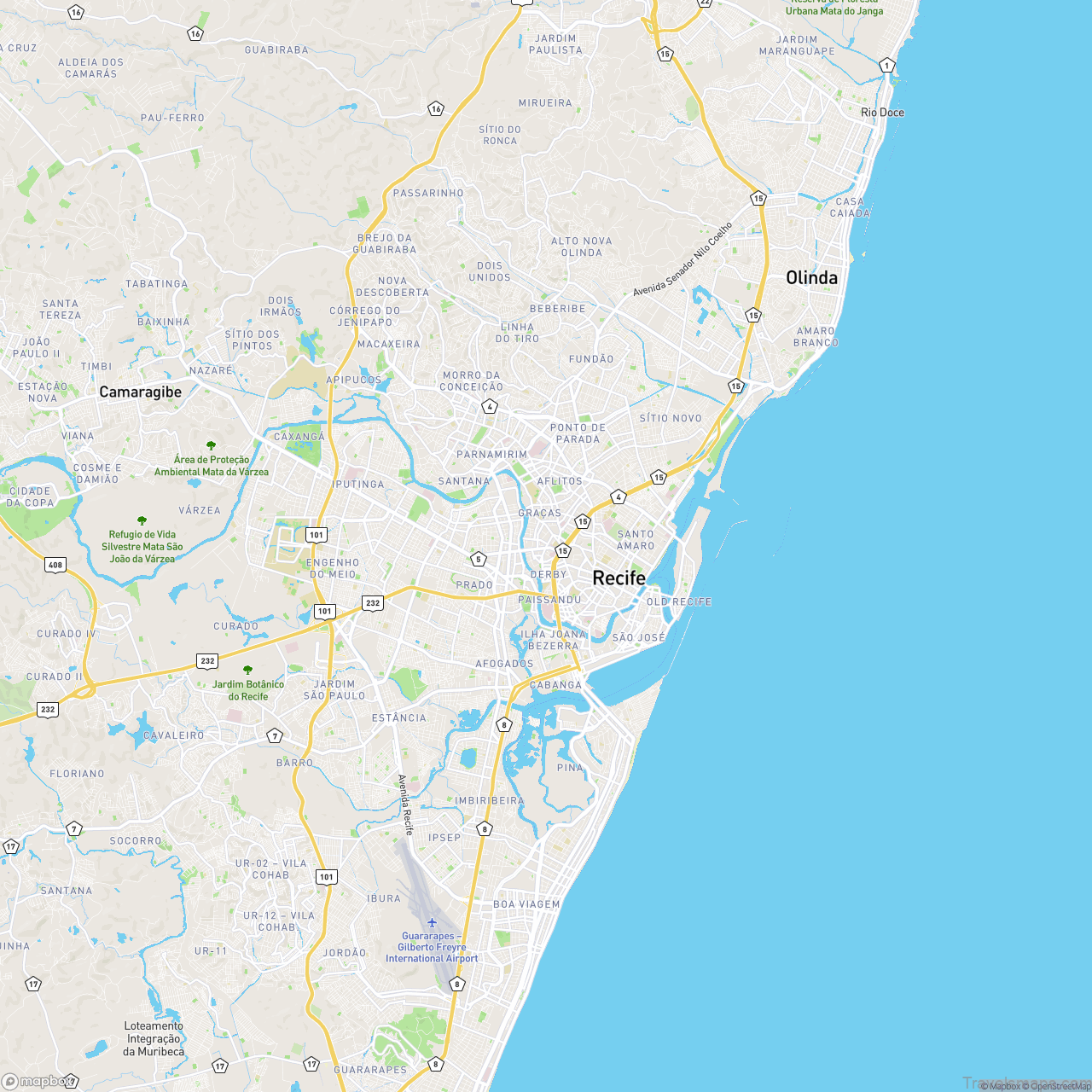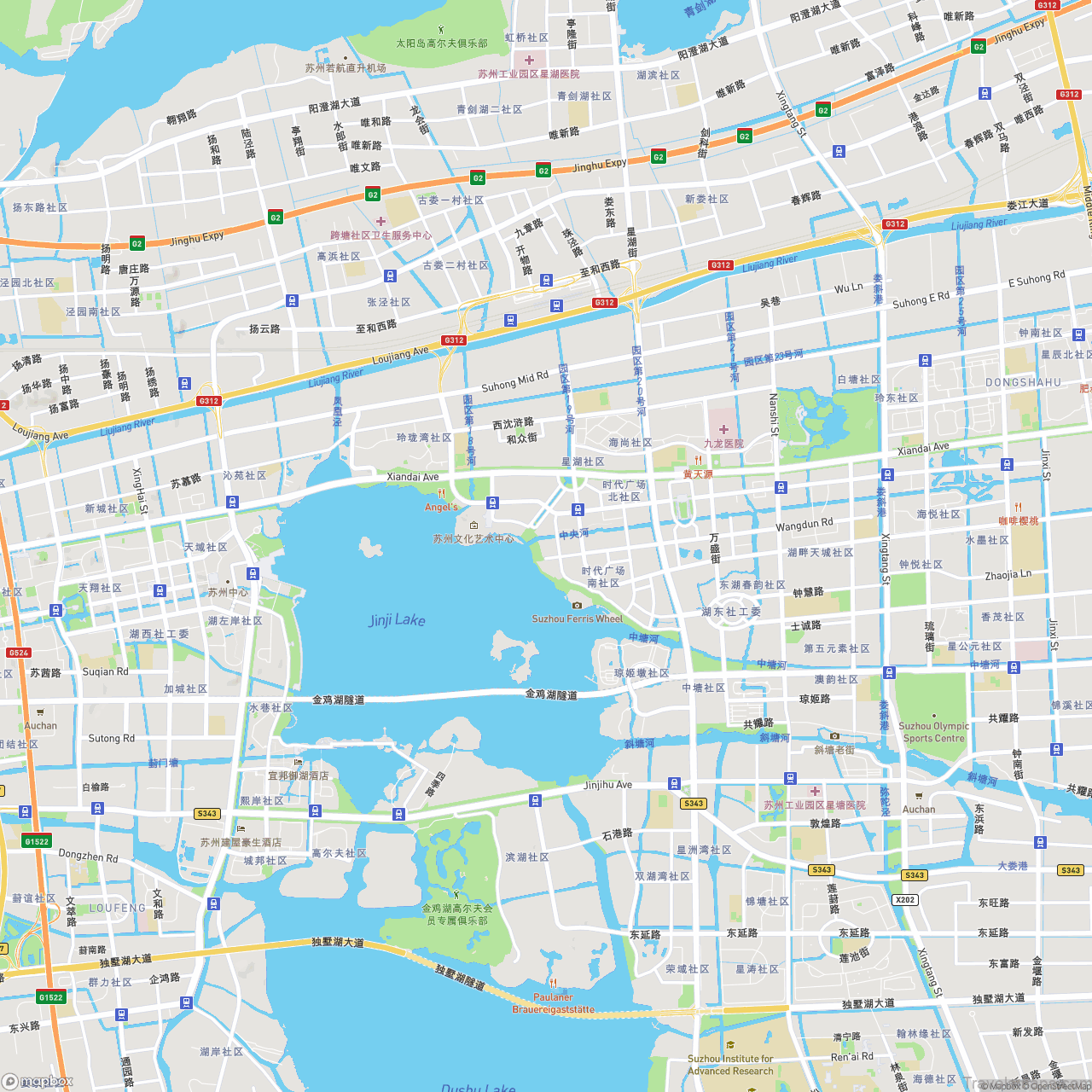
Suzhou, China Streets Map
Suzhou, an enchanting city known for its intricate waterways, ancient shrines, and beautiful gardens, offers a unique blend of traditional and modern China. The city’s layout, characterized by a grid pattern interspersed with meandering canals, reflects its historical significance and contemporary dynamism.
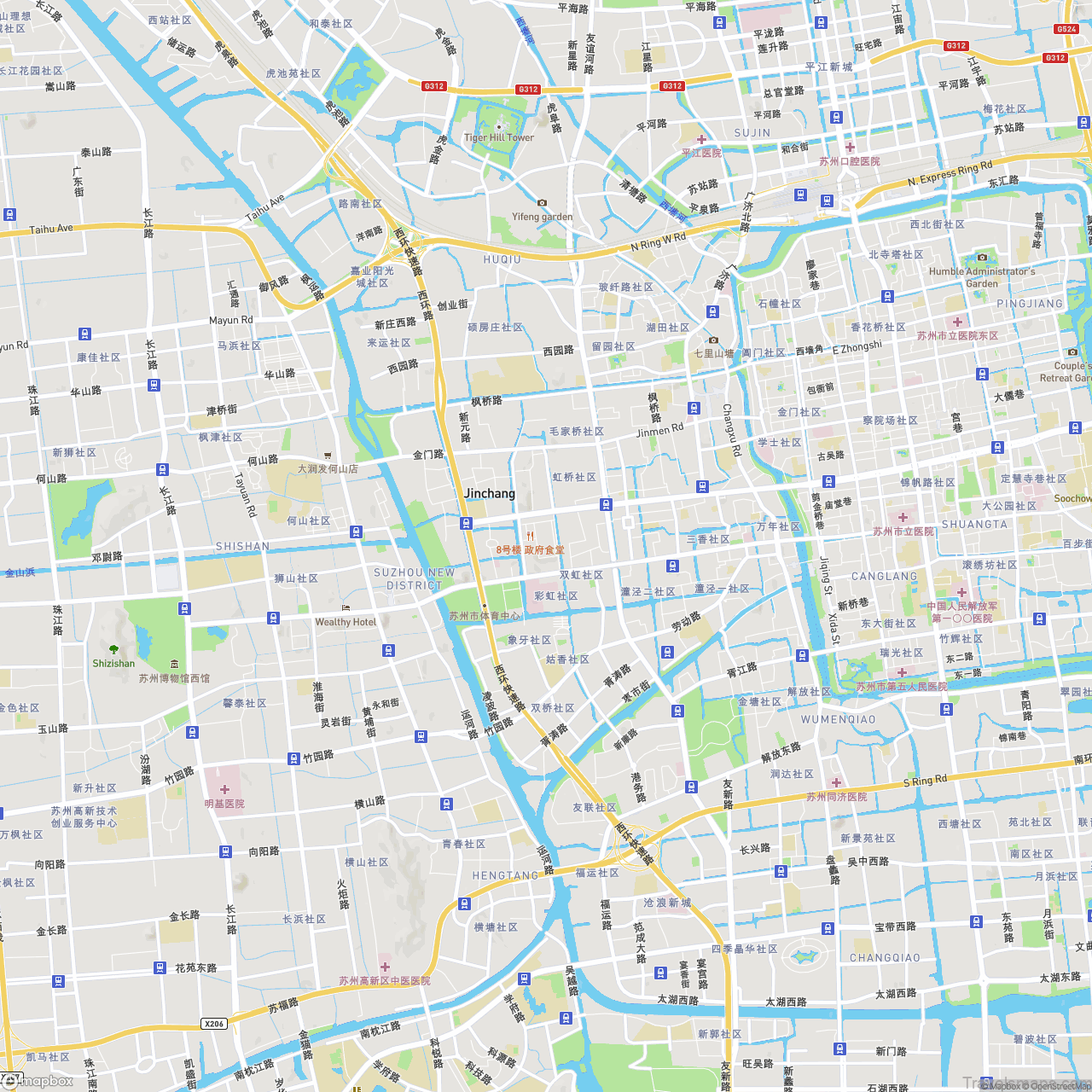
As you traverse the streets of Suzhou, you are taken on a journey through time. The city, often dubbed the “Venice of the East,” boasts a network of streets that seamlessly blend with its waterways. This design is a testament to the city’s ancient urban planning, which respected the natural landscape’s harmony and integrated it into the city’s functional aspects.
The map above provides a visual guide through Suzhou’s streets, highlighting the city’s organized complexity. Key thoroughfares are easily identifiable, providing straightforward navigation for both residents and visitors. These streets lead to various cultural, historical, and commercial hubs that contribute to Suzhou’s allure.
For tourists, the street map is an invaluable tool, offering insights into the city’s structure and aiding in the exploration of its numerous attractions. From the bustling Guanqian Street, known for its endless shopping options, to the serene atmosphere of Pingjiang Road, Suzhou’s streets tell the story of a city that has thrived through centuries. They hold a spectrum of experiences, from culinary delights to the arts, traditional crafts, and modern amenities.
Moreover, the conservation efforts in Suzhou are evident. Many streets still bear architectural elements from the Ming and Qing dynasties, offering a glimpse into the past. These historical imprints, set against the backdrop of modernity, create a vibrant urban tapestry that appeals to history buffs, culture enthusiasts, and casual tourists alike.
In conclusion, the streets of Suzhou encapsulate the spirit of China — a country where history reverberates through modern life. They are not just routes from one point to another but a destination in themselves, offering a rich, multifaceted experience of the city’s heritage and contemporary lifestyle.
Suzhou, China Hotels Map
Suzhou, with its classical gardens and silk industry heritage, is a city that promises diverse experiences. For travelers, this means finding the perfect place to stay is crucial, and Suzhou does not disappoint with its range of accommodations.
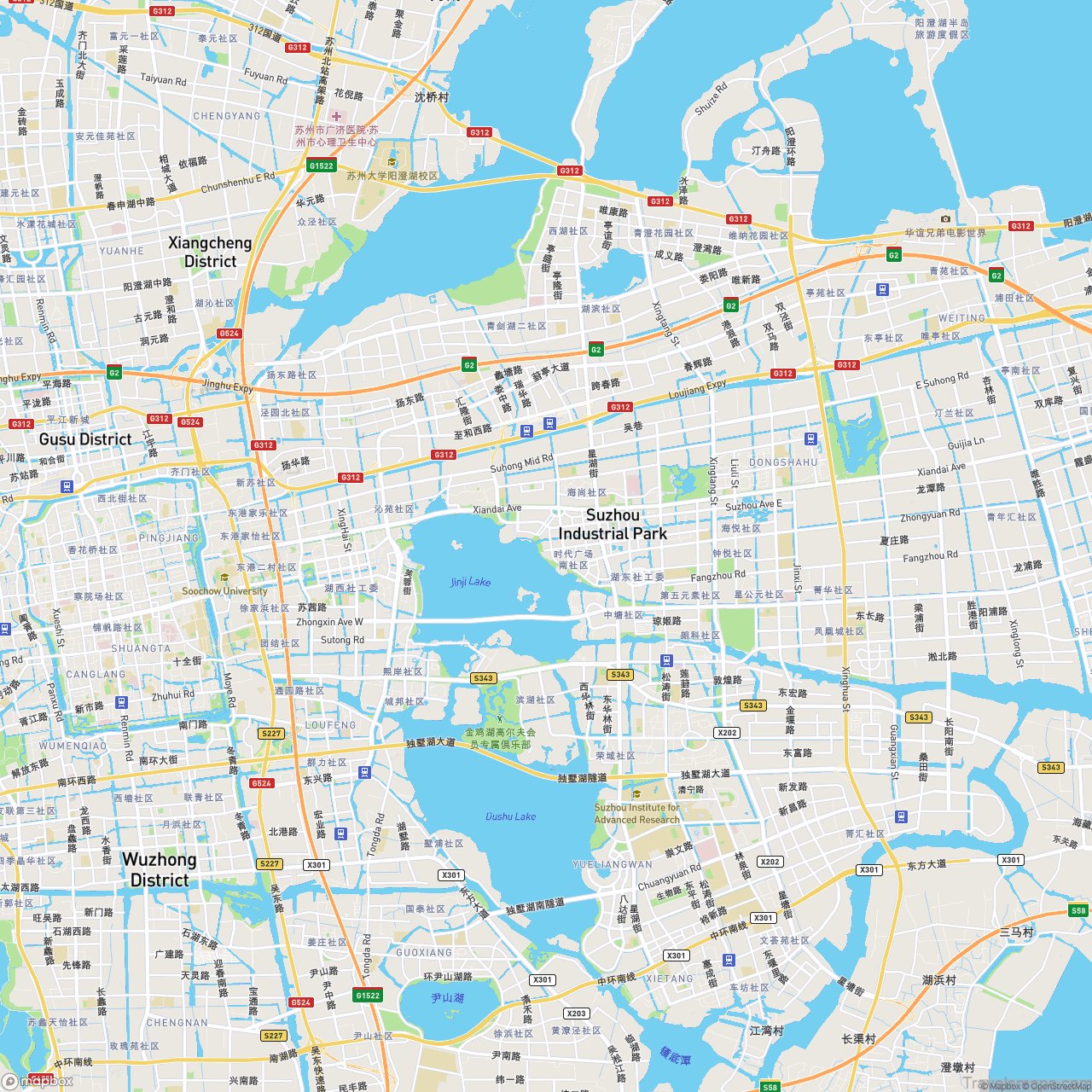
The hotels in Suzhou are scattered across the city, offering a variety of choices from luxury retreats to budget-friendly stays. The map above illustrates the locations of various hotels, providing a quick guide for travelers to select a place that suits their itinerary and preferences.
Central Suzhou is dense with hotels, catering to those who wish to be at the heart of the action. Staying in this area, visitors have quick access to major attractions such as the Humble Administrator’s Garden and Lion Grove Garden. The bustling downtown area, marked by historical landmarks and shopping districts, also hosts numerous hotels.
For a more tranquil experience, some hotels are situated near the shores of Jinji Lake, offering picturesque views and a peaceful environment. These establishments often combine modern luxury with traditional aesthetics, providing guests with a uniquely Suzhou experience.
Business travelers are not left out, with several hotels located close to the Suzhou Industrial Park. These accommodations are tailored for business needs, equipped with facilities for meetings and corporate events, and are conveniently located near tech hubs and exhibition centers.
One notable aspect of Suzhou’s hotels is their incorporation of traditional Chinese architecture and design elements, reflecting the city’s rich cultural heritage. From courtyard layouts to garden designs within the hotel premises, these features enhance the stay experience, making it distinctly reflective of Suzhou’s identity.
In selecting a hotel, visitors should consider proximity to tourist attractions, access to public transport, and the surrounding neighborhood’s ambiance. Whether it’s a family vacation, a solo adventure, or a business trip, the diverse hotel options in Suzhou ensure a comfortable stay for all types of travelers.
Suzhou, China Metro Map
Suzhou’s advancement in public transportation is evident through its extensive metro network, ensuring that the city’s scenic spots, business districts, and cultural landmarks are easily accessible.
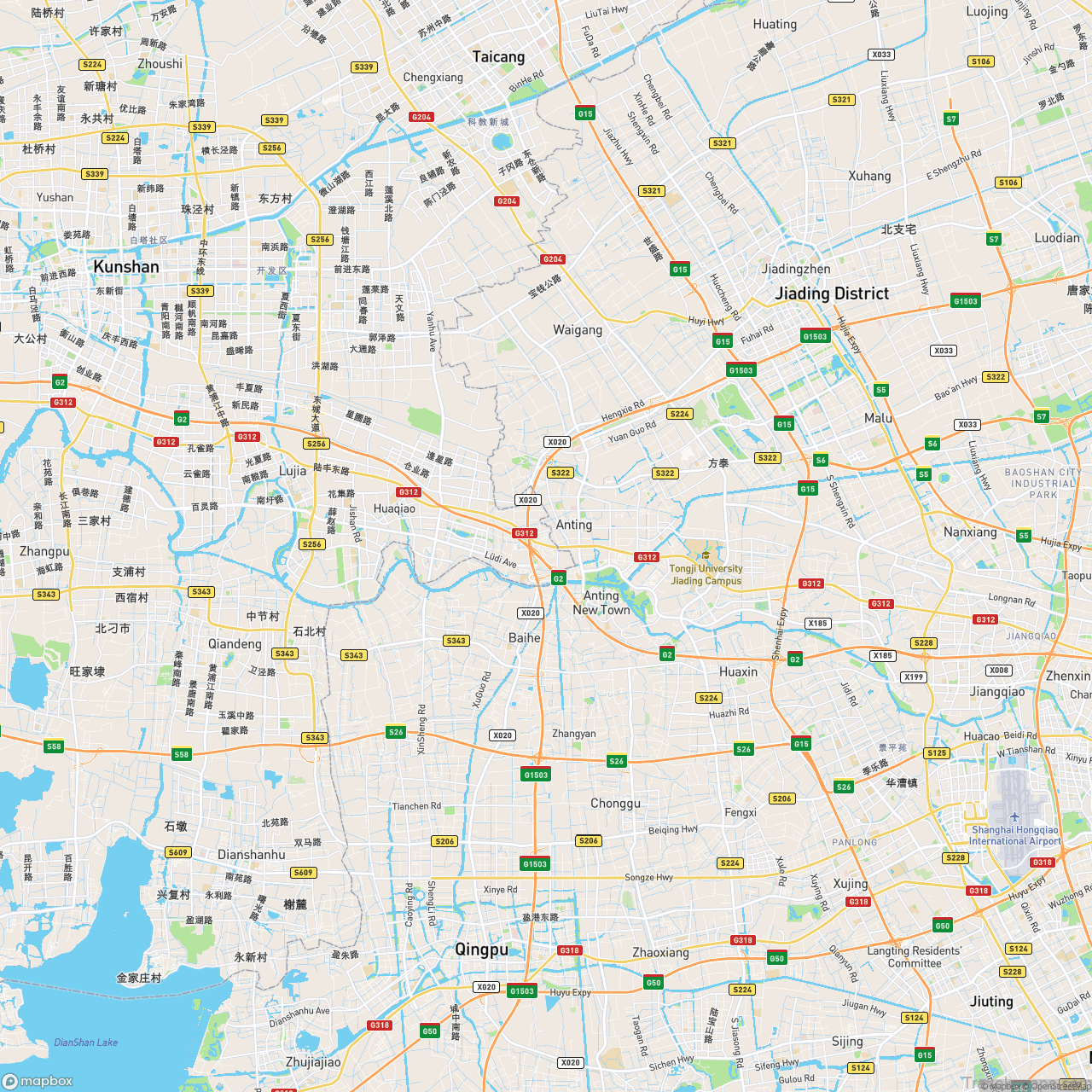
The Suzhou Metro encompasses several lines that cut across key areas of the city. This network not only caters to daily commuters but also serves tourists, guiding them through the city’s must-visit locales efficiently. The metro lines are designed to connect major hubs, including railway stations, commercial centers, and more, making the city’s vast expanse navigable for everyone.
One of the remarkable aspects of the Suzhou Metro is its integration with the city’s historical and modern attributes. Stations are often located near prominent attractions, such as the Suzhou Industrial Park, various classical gardens, and shopping districts, providing convenience and efficiency to travelers’ itineraries.
Additionally, the metro system in Suzhou is a testament to the city’s commitment to sustainable urban living. It supports the city’s environmental goals by offering a green alternative to commuting, thus reducing traffic congestion and contributing to cleaner air.
For first-time visitors, the metro also provides a quick, reliable way to grasp the city’s layout and understand the relationship between different districts. The well-maintained stations, clear signage with English translations, and detailed maps ensure a hassle-free journey across the city.
In conclusion, the Suzhou Metro is an embodiment of the city’s modernization efforts, standing as a convenient, fast, and eco-friendly means of transportation. It invites visitors to explore Suzhou’s wonders, making every trip an easy and comfortable journey.
Suzhou, China Airports Map
While Suzhou does not have its own international airport, it benefits from its proximity to several major airports, ensuring it is easily accessible to travelers from around the globe.
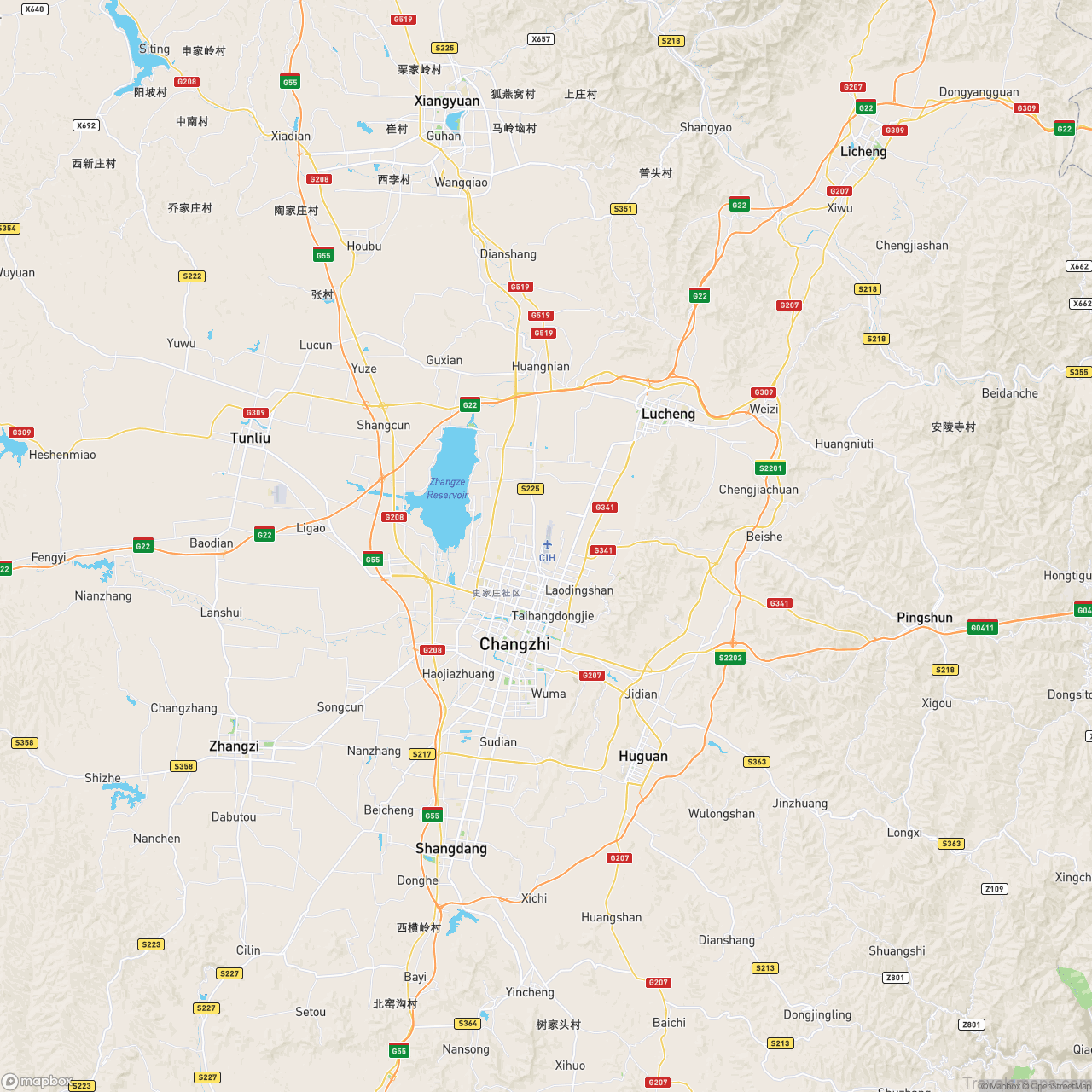
The map highlights the strategic location of airports near Suzhou, with the two most prominent being Shanghai Hongqiao International Airport and Shanghai Pudong International Airport. These airports serve as the primary gateways for international travelers planning to visit Suzhou, given their comprehensive list of global flight connections.
Shanghai Hongqiao International Airport, located approximately 100 kilometers from Suzhou, is a popular choice for travelers due to its closer proximity and efficient transportation links to Suzhou. The airport is connected to Suzhou by high-speed trains, long-distance buses, and taxi services, providing quick transfers for arriving passengers.
Shanghai Pudong International Airport, though slightly further away, is one of China’s most important international hubs. It offers a broader range of international flights, and its connectivity to Suzhou is also reliable, facilitated by direct buses and a combination of metro and high-speed train services.
For domestic travelers, Sunan Shuofang International Airport serves as a more localized option, handling flights from major Chinese cities. It’s situated closer to Suzhou and is connected via a short bus or taxi ride.
The accessibility provided by these airports demonstrates Suzhou’s strategic position in the Jiangsu Province, making it an attractive destination for both tourism and business. The variety of transportation options linking the airports to Suzhou ensures a seamless travel experience, catering to different preferences and budgets.
In essence, while Suzhou itself does not host an international airport, its excellent connectivity to major nearby airports compensates abundantly, offering convenience and efficiency to global travelers making their way to this charming city.
Suzhou, China Restaurants Map
Suzhou’s culinary scene is a delightful reflection of its rich cultural heritage, offering everything from traditional Jiangnan cuisine to international dishes. The city’s restaurants are scattered across various districts, each providing a unique dining experience.
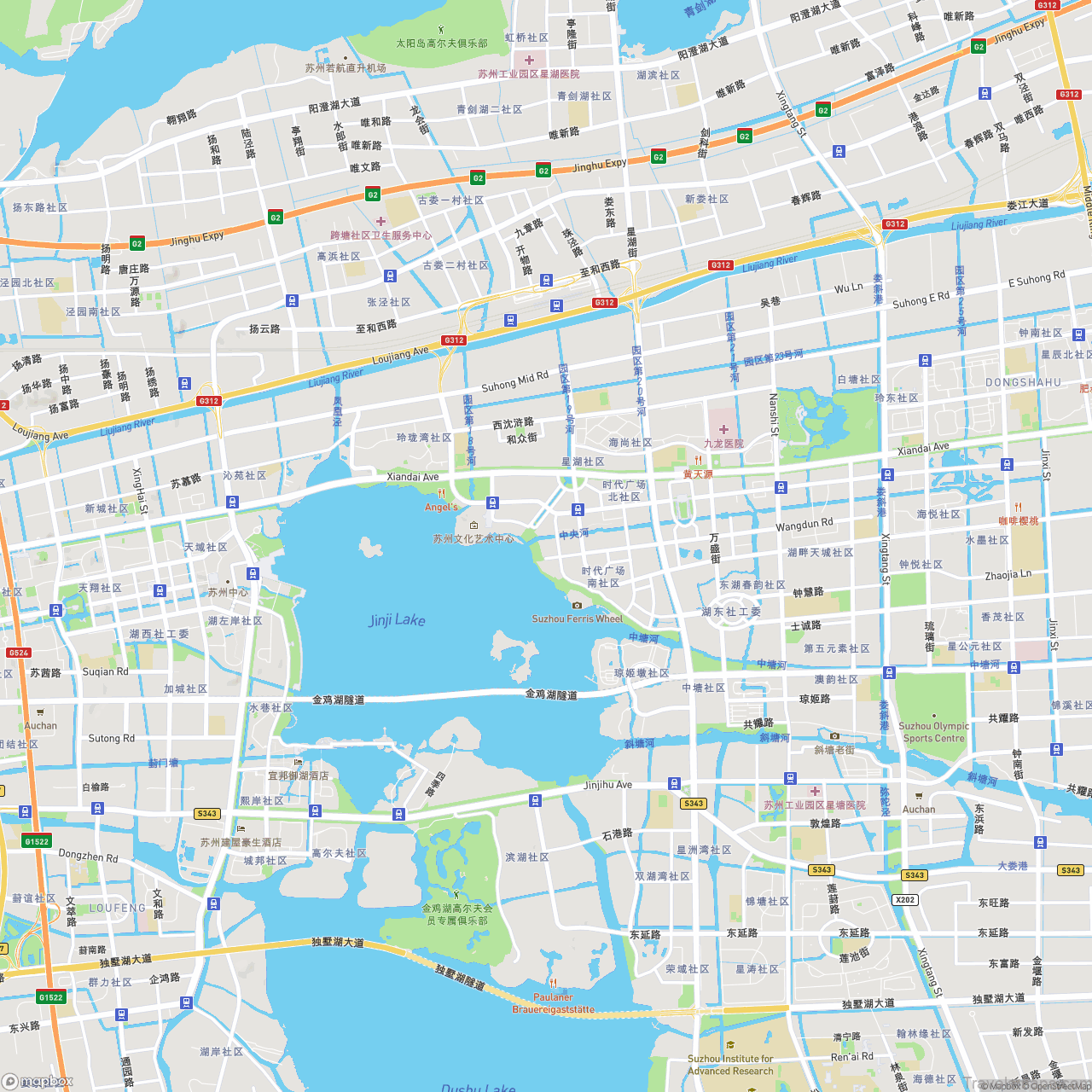
The restaurants in Suzhou are renowned for their sophisticated flavors, with many establishments serving recipes that have been passed down for generations. The map above showcases a variety of dining options available in the city, inviting food enthusiasts to embark on a gastronomic journey.
In the historic city center, restaurants offer authentic Suzhou dishes characterized by their subtle, sweet flavors and exquisite presentation. Signature dishes such as the squirrel-shaped mandarin fish, whitebait soup, and water shield with egg whites are a must-try for visitors.
For a luxurious dining experience, the restaurants around Jinji Lake provide a spectacular view to accompany your meal. This area, known for its modern ambiance, features both high-end Chinese restaurants and a range of international cuisines, catering to a diverse palate.
Street food in Suzhou is also not to be missed. The smaller alleys and marketplaces, particularly around Shantang Street and Pingjiang Road, are bustling with vendors offering local snacks like steamed buns, wontons, and fried pastries. These streets provide a more casual dining atmosphere, allowing visitors to savor a variety of tastes while soaking in the local culture.
Furthermore, Suzhou’s restaurants also pay homage to the city’s artistic heritage. It’s not uncommon to find eateries located in traditional Chinese buildings, where diners can enjoy tea ceremonies and Kunqu opera performances, making their dining experience memorable.
In conclusion, dining in Suzhou is not just about enjoying a meal; it’s an immersive experience that encompasses the city’s history, culture, and culinary artistry. Whether you’re seated in a posh restaurant overlooking a serene lake or in a lively street market, Suzhou promises an extraordinary feast for the senses.
Travel Guide to Suzhou, China
Embarking on a journey to Suzhou opens the doors to a world where ancient meets modern, and natural beauty intertwines with urban charm. Known as the “Venice of the East,” Suzhou is a city where narrow water canals, stone bridges, and meticulously designed gardens exist alongside sprawling urban districts, offering a harmonious blend of history, culture, and modernity.
Arriving in Suzhou: Travelers can reach Suzhou through various means. The city is served by several nearby airports, with the most prominent being Shanghai Hongqiao International Airport and Shanghai Pudong International Airport. High-speed trains, buses, and taxis connect these airports to Suzhou, providing quick and convenient transfers.
Navigating the City: Suzhou’s public transportation system is efficient and tourist-friendly. The Suzhou Metro, buses, and taxis are the primary modes of transport, making it easy for visitors to explore the city. For a more scenic route, traditional boats cruise along the ancient canals, offering a unique perspective of Suzhou.
Accommodations: Suzhou offers a wide range of accommodations to suit every budget and preference. From luxury hotels with serene lake views to budget-friendly hostels in the city center, visitors are spoilt for choice. For a more traditional experience, some travelers opt for boutique hotels set in classical Chinese buildings, offering an immersive cultural experience.
Sightseeing: Suzhou is renowned for its UNESCO World Heritage classical gardens, such as the Humble Administrator’s Garden and the Lingering Garden. These masterpieces of Chinese landscape design offer a tranquil retreat from the urban hustle. Historical landmarks like the Tiger Hill and Suzhou Museum enrich visitors’ knowledge of the city’s past, while modern attractions like the Suzhou Industrial Park showcase its contemporary edge.
Culinary Experiences: Dining in Suzhou is a delight, with options ranging from upscale restaurants to street food stalls. The city’s culinary tradition emphasizes fresh ingredients, subtle flavors, and artistic presentation. Local specialties to try include sweet and sour Mandarin fish, Suzhou-style mooncakes, and Biluochun green tea.
Shopping and Entertainment: Suzhou is a shopper’s paradise, offering everything from high-end boutiques to traditional markets. Local souvenirs include silk products, handcrafted fans, and embroidery. For entertainment, visitors can enjoy performances at the Suzhou Culture and Arts Center or explore the vibrant nightlife around Jinji Lake.
Local Etiquette: Respect for tradition and etiquette is appreciated in Suzhou. Politeness, modest dress, and a willingness to embrace local customs, such as participating in tea ceremonies, enhance the travel experience.
Safety: Suzhou is considered a safe city for travelers, with low crime rates and a secure environment. However, visitors are advised to follow standard safety precautions, especially in crowded areas.
In conclusion, a trip to Suzhou offers a rich, multifaceted experience, blending cultural exploration, leisure, and adventure. It’s a city where every turn holds a new discovery, promising an unforgettable journey for all who visit.
History of Suzhou, China
Suzhou, one of China’s oldest cities, boasts a history that stretches back over 2,500 years. This ancient city has witnessed the ebb and flow of dynasties, each leaving its unique imprint, contributing to the rich tapestry that is Suzhou today.
Founding and Early Development: Established in 514 BCE as the capital of the Wu Kingdom, Suzhou was strategically located along the lower Yangtze River. Its advantageous position made it a center for trade and cultural exchange from its earliest days. The Grand Canal, constructed during the Sui Dynasty, further elevated Suzhou’s status, linking it directly to the imperial capital.
Golden Age: Suzhou experienced its golden age during the Ming (1368–1644) and Qing (1644–1912) dynasties. It was during this period that its famous classical gardens, a symbol of the city, were constructed by wealthy officials and merchants. These gardens, with their ethereal beauty, are a testament to the sophisticated landscape architecture of ancient China.
Silk and Economic Prosperity: Throughout its history, Suzhou was synonymous with high-quality silk production, earning it the nickname “Silk City.” The prosperous silk trade contributed to the city’s wealth, allowing for patronage of the arts, and making Suzhou a cultural beacon during imperial times.
Modern Era: The 20th century was a period of transformation for Suzhou as it faced the challenges of modernization. Despite the pressures of change, the city managed to preserve its historical identity while embracing development. The establishment of the Suzhou Industrial Park in 1994, a landmark collaboration with Singapore, marked Suzhou’s emergence as a modern industrial hub.
Cultural Legacy: Suzhou’s cultural contributions are diverse, ranging from Kunqu opera, one of the oldest forms of Chinese opera, to the Suzhou embroidery, renowned for its intricacy and finesse. The city’s rich artistic heritage continues to thrive, drawing on its historical legacy while evolving with contemporary influences.
Today, Suzhou stands as a city where history resonates in harmony with modern life. Its well-preserved gardens, ancient structures, and vibrant cultural scene make it a living museum, offering insights into centuries of Chinese tradition and progress.
Frequently Asked Questions (FAQs) about Suzhou, China
- Q: How do I travel around Suzhou? A: Suzhou has an efficient public transportation system, including buses, taxis, and a metro system. For scenic travels, you can use traditional boats along the canals.
- Q: What are the must-visit attractions in Suzhou? A: Don’t miss the classical gardens like the Humble Administrator’s Garden, historical landmarks such as Tiger Hill, and modern attractions like Suzhou Industrial Park.
- Q: What unique souvenirs can I buy in Suzhou? A: Suzhou is famous for its silk products, handcrafted fans, and embroidery. These items reflect the city’s cultural heritage.
- Q: What local dishes should I try in Suzhou? A: Sample local favorites like sweet and sour Mandarin fish, Suzhou-style mooncakes, and Biluochun green tea.
- Q: Are there any cultural performances I can attend in Suzhou? A: Yes, you can enjoy traditional Kunqu opera performances, classical music concerts, and modern shows at various venues around the city.
Maybe You Like Them Too
- If You’re Traveling To Gainesville, This Map Will Help Guide You
- The Best Map of Fukuoka
- Funafuti Travel Guide for Tourist: Map of Funafuti
- Fujairah Travel Guide For Tourist
- Galtür Travel Guide To Tourist – Map of Galtür

